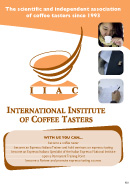How can an incompetent barista do any good?
by Luigi Odello
Secretary General of the International Institute of Coffee Tasters, he is also a lecturer at the University of Udine, Verona and at the Cattolica in Piacenza. In addition he is the Chairman of the Taster Study Center and Secretary General of the Italian Espresso National Institute
 Several of us kept asking ourselves the question during the course for the managers of the permanent training centres of the International Institute of Coffee Tasters which was held not long ago in Brescia.
Several of us kept asking ourselves the question during the course for the managers of the permanent training centres of the International Institute of Coffee Tasters which was held not long ago in Brescia.
One of the attendees told us that during his training courses he has the habit of telling to the barista who gives him a wrong espresso: “If your coffee is like this, I wish your clients did not pay you”. Several people stressed that the barista who is not able to select the right blend and process it with expertise does not only a wrong to the world of coffee, thus encouraging alternative consumption, but also does a wrong to his colleagues in that the clients lose their passion for the coffee shop.
Therefore, an incompetent barista does harm to the roasters who market a good quality blend, to his own coffee shop, to his colleagues and, it goes without saying, to consumers.
Expressed in these terms, the situation seems to be extremely negative. Let us try and give a look at things from a different point of view. The espresso is without doubts the most difficult way to prepare coffee. It makes it possible to have the highest level of extraction of the contents of the cells – both good and bad – of approximately 50 coffee beans. In addition, it gives the highest concentration of the active sensory components. More than that: the quality of the blend is inversely connected with the ease of preparation. Put it in other words: the higher the quality, the more difficult it is to extract it in the right way. This is for sure an element of decline of the coffee from the coffee shop: the barista wants an easy blend, the roaster might as well be happy because he save on the resources necessary to produce it, the consumer is left unsatisfied and moves on to alternative consumption or to preparing coffee at home or at the workplace. The coffee shop loses resources and its staff is less and less qualified.
Efforts should be made to try and reverse this vicious cycle into a virtuous cycle: reward the baristas who do an excellent job, stimulate their ambition, make them feel professionals. In this respect, the Italian Espresso National Institute is doing a good job in that it has qualified more than 2.500 coffee shop operators. No doubts that also competitions are stimulating. But do these competitions really go in the right direction and do they really use assessment mechanisms which make it possible to reliably define the barista who is able to prepare a cup of perfect espresso? Trying to tackle this issue thoroughly would lead us very far away from the topic we started debating.
Falling back into line: just as the success of wine has been driven by the efforts to improve quality through bitter criticism and self-criticism, by the same token, the future of the espresso at the coffee shop rests in the hands of three components of the process: the machines manufacturer, the roaster and the barista. Of the three, the barista is the most important in that the barista is able to influence the other two. Nowadays, in any ‘trattoria’ a corky bottle of wine is immediately replaced with the apologies of the owner. Unfortunately, this is not what happens at the coffee shop with a flawed cup of coffee.

